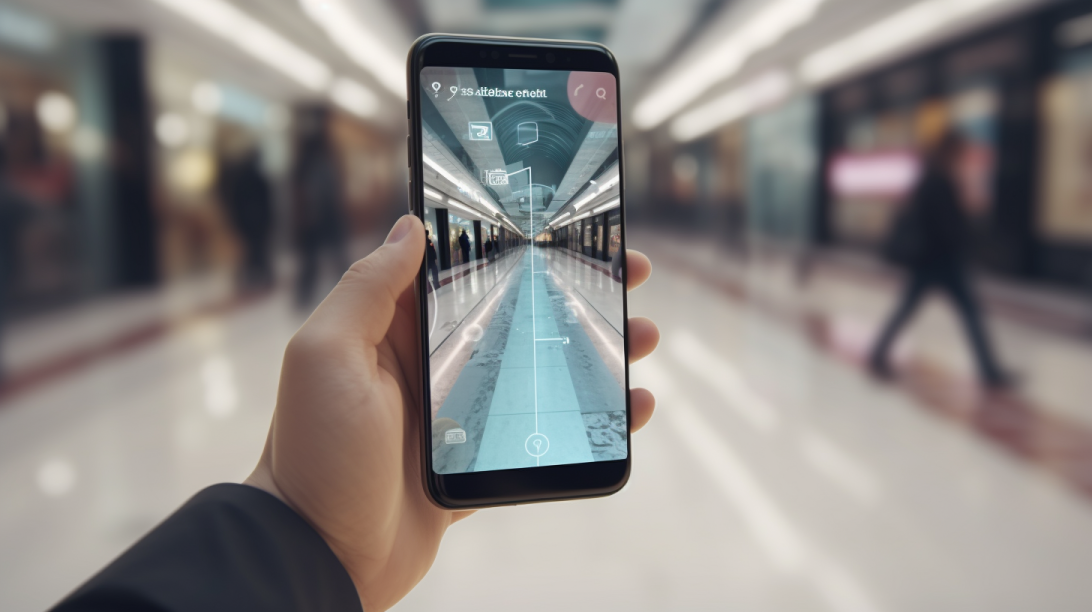Shopping malls in Dubai are not just the shopping havens. They spread into large areas where one can find luxury, entertainment, and the entire larger culture of an all-encompassing experience, but to find one’s way through such spaces feels like entering a jelly maze.
You can imagine being lost inside a colossal mall of 5.9 million square feet, like The Dubai Mall, and circling the same corridor three times in search of a particular store. Sounds frustrating, right? Well, say hello to AR Indoor Navigation in Dubai, which would change the visitor experience of exploring spaces that have come to be known as retail giants.
This is not science fiction. Augmented Reality (AR) is changing the AR customer experience by bringing together real worlds and digital guidance. Let’s have a look at what this technology is doing to change Dubai’s malls: transforming them into intuitive and engaging spaces and how it’s a win-win for consumers and the retailers concerned.
The Problem: Lost in Retail Paradise
Dubai’s malls are indeed matters of architecture but oversize generally presents a problem to a newcomer. Articulated layouts, promotions, and events alarm static maps and signs concerning them. Studies reveal that 61% of shoppers find navigating large malls a key frustration, leading to missed sales and dampened experiences.
The solution? AR Indoor Navigation Systems in Dubai. Think of them as GPS for the indoors, but smarter. Using technologies like Visual Positioning Systems (VPS) and AR overlays, these tools guide visitors with arrows, interactive maps, and real-time updates, turning confusion into seamless exploration.
How AR Transforms the Shopping Journey
1. Intuitive Wayfinding with a Digital Twist
AR navigation apps like ARway and IPERA use smartphone cameras to overlay directional cues onto live video feeds. Shoppers simply point their devices to see floating arrows or highlighted paths to stores, restrooms, or events. For instance, The Dubai Mall’s app uses beacon technology to update positions twice per second, ensuring centimeter-level accuracy.
It’s more than just doing it efficiently. This will make you walk through Dubai Festival City Mall during the 30th anniversary of the Dubai Shopping Festival. AR prompts could guide you to limited-time pop-ups or flash sales, blending navigation with discovery.
2. Personalized AR Customer Experience
AR isn’t just a map, it’s a concierge. By analyzing shopper behavior, these systems deliver tailored recommendations. For example, a frequent tech shopper might receive AR alerts about a new gadget launch nearby.
During Ramadan or Eid festivities, promotions for gifting ranges or dining deals could pop up as users approach relevant stores.
Brands like Chanel and Samsung are already using AR mirrors for virtual try-ons, reducing returns and boosting confidence. In Dubai’s luxury malls, this tech elevates the AR customer experience from transactional to immersive.
3. Real-Time Updates and Gamification
Malls are dynamic: stores relocate, events pop up, and promotions change hourly. AR navigation integrates live data, ensuring users never miss a beat. During Dubai’s 3-Day Super Sale, for instance, shoppers could receive AR notifications about 90% discounts as they pass participating outlets.
Gamification adds fun to functionality. Imagine earning digital rewards for visiting certain stores or completing scavenger hunts, a tactic already boosting engagement in malls using platforms like ARway.
Why Dubai’s Malls Are Perfect for AR Innovation
Dubai’s retail sector thrives on blending tradition with cutting-edge tech. The city’s 2025 Retail Calendar, packed with events like the Dubai Esports Festival and Eid Al Fitr celebrations, creates ideal opportunities for AR integrations.
Moreover, Dubai’s push for smart city status aligns with AR’s infrastructure needs. High 5G penetration ensures low-latency AR experiences, while beacon and Wi-Fi networks provide the backbone for precise indoor positioning.
Challenges and the Road Ahead
While AR navigation offers immense potential, challenges like data privacy and infrastructure costs remain. Blockchain integration is emerging as a solution to secure user data, while green navigation systems aim to reduce energy consumption.
The future? Think AI-driven predictive navigation. Systems could learn individual preferences, like avoiding crowded areas or adjusting routes based on real-time foot traffic. During peak seasons like Dubai Summer Surprises, this could streamline visitor flow and enhance safety.
Conclusion:
AR Indoor Navigation Dubai isn’t a luxury, it’s becoming a necessity. By turning overwhelming spaces into interactive adventures, AR fosters loyalty, boosts sales, and positions malls as innovators. For shoppers, it’s the difference between frustration and delight; for retailers, it’s a goldmine of data and engagement.
As Dubai races toward its 2025 tourism goals, AR will play a starring role in creating unforgettable retail experiences.
For businesses in Dubai looking to implement AR customer experience tools, Limina Studios offers tailored AR navigation solutions. Specializing in seamless integrations, from beacon networks to AI-driven personalization, our team of experts transforms retail spaces into intuitive, future-ready destinations.






















